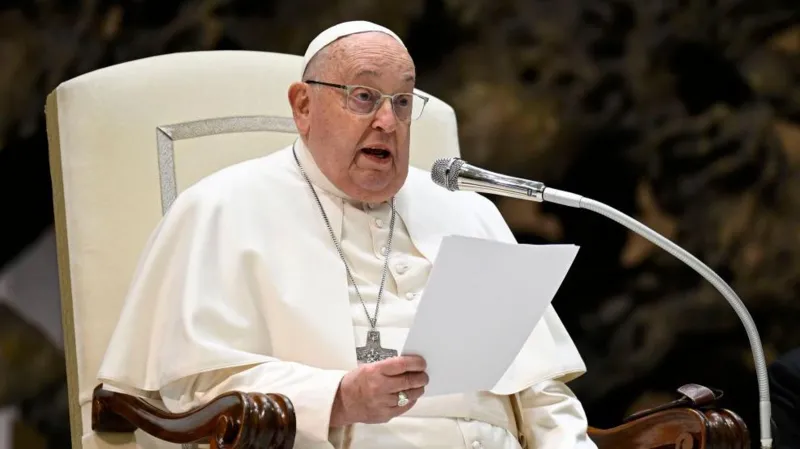Latest News
Pope still critical after 10th night in hospital – Vatican

Pope Francis is resting, but remains “critical” with respiratory and kidney problems, more than a week after being admitted to hospital, the Vatican has said.
“The night went well, the Pope slept and is resting,” a Monday morning statement said.
The Pope has been receiving high-flow oxygen therapy and blood transfusions – as well as treatment for a kidney problem.
The Pope was admitted to Rome’s Gemelli Hospital on 14 February after experiencing breathing difficulties for several days, where he was first treated for bronchitis before being diagnosed with pneumonia in both lungs.
On Sunday, the Pope’s thrombocytopenia – a condition that occurs when the platelet count in the blood is too low – was stable, the statement said.
That morning, the Pope “participated in the Holy Mass, together with those who are taking care of him during these days”, the statement continued.
The Vatican did not offer a prognosis, given the “complexity of the clinical picture”.
On Saturday, the Vatican said that the Pope had experienced a respiratory crisis and was in a “critical” condition, but later on Sunday released an update that he had “not presented any further respiratory crises”.
Earlier on Sunday, the Pope issued a statment asking Catholics to pray for him after he was unable to deliver the traditional Angelus prayer in person for the second week running.
The pontiff is particularly susceptible to pneumonia, an infection of the lungs that can be caused by bacteria, viruses or fungi, after he contracted pleurisy – an inflammation of the lungs – as a young man and underwent a partial lung removal.
The leader of the Roman Catholic church has been admitted to hospital multiple times during his 12-year tenure, including being treated for bronchitis at the same hospital in March 2023.
From Argentina, Pope Francis is the first Latin American, and first Jesuit, to lead the Roman Catholic Church.
[BBC]
Latest News
Krishnamurthi, van Schalkwyk keep USA alive

Half-centuries from Monak Patel and Sanjay Krishnamurthi set up USA’s second group-stage victory in Chennai and kept their hopes of a Super Eights spot alive, as they held off Namibia’s charge under the floodlights. Shadley van Schalwyk extended his lead at the top of the tournament wicket-takers’ chart with 2 for 30, the comfortable margin of victory also providing a potentially crucial boost to USA’s net run rate.
Having opted to bat, Monank was given a life before he had scored and made the most of it with a 27-ball half-century that set the USA tempo during the powerplay. Although Namibia reined in the scoring, chiefly through Willem Myburgh’s spell 2 for 22, a partnership of 87 off 47 between Krishnamurthi and Milind Kumar put USA back on track.
Krishnamurthi, in particular, had a USA-supporting crowd on their feet with a scintillating maiden T20I fifty that featured four fours and six sixes, as Namibia’s bowling fell apart during the final straight, 83 runs coming from the last six overs.
Led by Louren Steenkamp’s 33-ball half-century, Namibia were up with the asking rate at the same point of their innings, but they lacked the fireworks to finish off what would have been their highest successful chase in T20Is. They could still play a part in the Super Eights calculation, however, with USA having finished their campaign and left to hope that results in the final three Group A games go their way.
Steenkamp thumped Ali Khan’s first ball through midwicket to get Namibia’s chase off and running, and he was the main aggressor through an opening stand with Jan Frylinck that was worth 54 in 32 deliveries. Khan felt the brunt, as his second over went for 20, Steenkamp crunching fours through cover and point before hauling another six over deep backward square leg.
Frylinck had not got going in the same way, however, and he departed the ball after launching van Schalkwyk for six – curiously, van Schalkwyk’s seventh wicket bowling the sixth over in this World Cup – as Namibia reach 57 for 1 at the end of the powerplay.
Another solid partnership ensued between Steenkamp and Jan Nicol Loftie-Eaton, with boundaries coming regularly against the spinners, before the latter fell attempting to reverse-ramp Saurabh Netravalkar. Steenkamp notched fifty in the next over, and went on to make his highest T20I score, but became Shubham Ranjane’s maiden wicket in the format, slapping a half-tracker to point. Van Schalkwyk then nicked off Namibia’s captain, Gerhard Erasmus, for a ponderous 6 off 10 with a slippery cross-seamer as the asking rate climbed to 15 an over, from which point the USA seamers shut the chase down.
USA’s captain is their all-time leading run-scorer in T20Is, and he became the first representing the country to pass 1000 runs in the format during this innings. He could – probably should – have been out on nought, though. Ruben Trumpelmann’s second legitimate delivery kicked up and found the outside edge, the ball looping high towards point where it was intercepted by Dylan Leicher – only for the chance to burst through his hands.
Monank settled with a flat six through midwicket off JJ Smit in the second over and then allowed Shayan Jahangir to make some of the early running in their partnership. He began the fifth over by striking Trumpelmann over cover for six more, then collared Smit’s second over to the tune of 19 – lofted six over long-on, slash to deep third, cover-driven four – as USA racked up 65 without loss in the powerplay.
Having got off to a flyer, USA then only managed to score 51 from the next eight overs as the Namibia spinners dragged it back. Jahangir fell in Myburgh’s first over, trying to drag a legbreak to the shorter boundary but top-edging to mid-on, and Monank had another slice of luck when looking to launch the same bowler in the ninth, with neither Frylinck nor Smit committing to going for the chance at wide long-on, as the ball bounced between them for four.
Monank went to a 27-ball fifty with a single off his next ball, but only added two to his score before falling to the Myburgh-Smit combination when trying to clear long-on. And although Erasmus made a loose start when belatedly introduced for the 12th, conceding a six and a four from his first three balls, when Saiteja Mukkamalla became the third batter to hole out, Loftie-Eaton juggling a relay catch at long-on, USA were 103 for 3 with two new batters at the crease
There was an indication of Krishnamurthi’s power when he hauled his third ball, from Erasmus, over the leg side for six. After a couple of overs of reconnaissance against Myburgh and Loftie-Eaton’s legspin, he and Milind went back on the offensive. Krishnamurthi twice smashed Bernard Scholtz’s left-arm spin into the Chepauk stands before Milind went down the ground for his first boundary in an over than cost 20.In the next, Milind went all the way across his stumps to fetch Smit over the short boundary at backward square leg, then Krishnamurthi hit the afterburners in an over from Trumpelmann that went for 26. Again, Namibia hurt their own chances, Erasmus taking an excellent running catch off Krishnamurthi but seeing the ball pop out of his hand as he rolled over. Instead of being dismissed for 32, Krishnamurthi went 4-6-6-6, with a high full toss no-ball thrown in, to bring up his maiden T20I fifty from 23 deliveries.Erasmus and Trumpelmann combined to only concede 24 from the last three, as USA ended just shy of the 200-mark. But the damage to Namibia’s chances had already been done.
Brief scores:
USA 199 for 4 in 20 overs (Sanjay Krishnamurthi 68*, Monank Patel 52, Shayan Jahangir 22, Saiteja Mukkumalla 17, Milind Kumar 28; Willem Myburgh 2-22, Gerhard Eramus 2-27) beat Namibia 168 for 6 in 20 overs (Louren Steenkamp 58, Jan Frylink 19, Jan Nicol Loftie-Eaton 28, JJ Smit 31, Zane Green 18; Ali Khan 1-43, Saurabh Netravalkar 1-27, Shadley van Schalkwyk 2-30, Shubham Ranjane 1-06) by 31 runs
[Cricinfo]
Latest News
Pakistan bowl; no handshakes between captains at toss

Salman Agha won the toss for Pakistan and decided to bowl first on what he felt was a “tacky” surface. If tacky to begin with, pitches tend to get better as the temperature comes down in the night. India read the game differently. They loaded another spinner into the XI, and their captain Suryakumar Yadav said they would have batted first anyway. That suggests they expect the pitch to slow down enough to counter any disadvantage that possible dew might bring on later in the night. As has been the case since the Asia Cup in September, the captains didn’t shake hands at the toss.
While Pakistan remained unchanged, India welcomed back their regular opener Abhishek Sharma, who sat out of the last game with a stomach illness. He took Sanju Samson’s place, making it two left-hand batters at the top, and Kuldeep Yadav, replaced left-arm quick Arshdeep Singh.
Agha might have chosen to chase, but he did say the pitch overall was expected to be slower than SCC, which is where they have been playing in this World Cup so far.
The result at the toss meant we were not far away from the anticipated clash between India’s powerhouse batting and Pakistan’s latest mystery spinner, Usman Tariq, who bowls without a run-up, whose height of release varies massively from ball to ball, and whose pause in the delivery stride has been discussed endlessly. Four international matches old, Tariq averages under eight per wicket and has conceded less than a run a ball.
India: Ishan Kishan (wk), Abhishek Sharma, Tilak Varma, Suryakumar Yadav (capt.), Hardik Pandya, Shivam Dube, Rinku Singh, Axar Patel, Kuldeep Yadav, Varun Chakravarthy, Jasprit Bumrah.
Pakistan: Sahibzada Farhan, Saim Ayub, Salman Agha (capt.), Babar Azam, Shadab Khan, Usman Khan (wk), Mohammad Nawaz, Faheem Ashraf, Shaheen Shah Afridi, Usman Tariq, Abrar Ahmed
[Cricinfo]
Latest News
May the blessings of Lord Shiva bring peace, good health, and spiritual fulfillment to your homes and to our beloved country – PM

Prime Minister Dr Harini Amarasinghe in her Maha Shiva Ratri message wished that the blessings of Lord Shiva bring peace, good health and spiritual fulfillment to every home and our beloved country.
The PM’s Maha Shiva Ratri message:
“As we observe the sacred occasion of Maha Shivaratri, I extend my warmest greetings to the Hindu community of Sri Lanka and to devotees across the world.
Maha Shivaratri, the “Great Night of Shiva,” stands as a profound symbol of the triumph of light over darkness and wisdom over ignorance. It is a time for deep reflection, spiritual discipline, and the pursuit of inner peace.
In our multicultural and multireligious society, this festival reminds us of the shared values that unite us — selflessness, compassion, and the strength to overcome challenges through unity and faith. As devotees spend the night in prayer and meditation, may we all reflect on how we can contribute to building a more harmonious, inclusive, and prosperous nation.
May the blessings of Lord Shiva bring peace, good health, and spiritual fulfillment to your homes and to our beloved country”.
-

 Life style15 hours ago
Life style15 hours agoMarriot new GM Suranga
-

 Business5 days ago
Business5 days agoAutodoc 360 relocates to reinforce commitment to premium auto care
-

 Midweek Review5 days ago
Midweek Review5 days agoA question of national pride
-

 Opinion4 days ago
Opinion4 days agoWill computers ever be intelligent?
-

 Features15 hours ago
Features15 hours agoThe Rise of Takaichi
-

 Midweek Review5 days ago
Midweek Review5 days agoTheatre and Anthropocentrism in the age of Climate Emergency
-

 Editorial7 days ago
Editorial7 days agoThe JRJ syndrome
-

 Features15 hours ago
Features15 hours agoWetlands of Sri Lanka:













